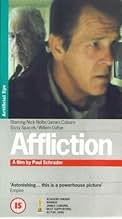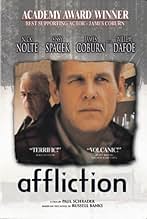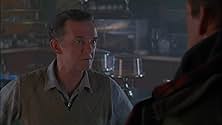Un poliziotto di una cittadina profondamente turbato indaga su una morte sospetta di caccia mentre altri eventi mettono a rischio la sua sanità mentale.Un poliziotto di una cittadina profondamente turbato indaga su una morte sospetta di caccia mentre altri eventi mettono a rischio la sua sanità mentale.Un poliziotto di una cittadina profondamente turbato indaga su una morte sospetta di caccia mentre altri eventi mettono a rischio la sua sanità mentale.
- Vincitore di 1 Oscar
- 8 vittorie e 19 candidature totali
- Jack Hewitt
- (as Jim True)
- Frankie Lacoy
- (as Chris Heyerdahl)
- Jimmy Dane
- (as Charles Powell)
Recensioni in evidenza
Nick Nolte stars in this dark story of a the lone policeman in a small New Hampshire town investigating a hunting accident. James Coburn is excellent as Nick Nolte's father, a brutal and angry old man who typifies a sick machismo which has in turn afflicted his son. His acting is extraordinary as is Nolte's although their styles are different. Noltle is subtle; his facial expressions are controlled and typical of a man who has learned to hold in emotion. Coburn's face, on the other hand, is more deeply expressive; his eyebrows move, his mouth hardens, his eyes glare.
This is the kind of dark, brooding movie that I like. For a brief few hours I enter its world and get completely absorbed in the characters in the way I did with "A thousand Acres" or "The Horse Whisperers". Like these films, there are no easy answers and the conclusion does not wrap up in a neat little Hollywood package that is soon forgotten.
Paul Schrader's movies can have a dark, unsettling edge to them, and this movie is no exception.
Maybe because I brought personal baggage to the table while watching this, is why this movie gripped me so much. I have alcoholic relatives in my immediate and extended family, and I have seen what their anger and destructive behavior hath wrought.
Nick Nolte and James Coburn's characters made me squirm. Coburn received a best supporting Oscar for his role, and it is well-deserved. His character is a mean, vengeful, hateful alcoholic who inflicts his pain on others and afflicts one of his sons, Wade, played by Nick Nolte.
Very gripping and intense family drama.
Wade Whitehouse (Nick Nolte) is a cop in a small New England town investigating a hunting accident which he believes is a murder. He hopes that it might make him the town hero, but several conditions work against everyone. First and foremost is Wade's alcoholic, abusive father (Coburn). Pretty much anytime that we see his father, the man is still drinking and being as nasty as possible to everyone around him. Wade's brother (Willem Dafoe) is too afraid to speak his mind. Wade's hubby (Sissy Spacek) is simply getting nervous about everything around her. And the ending isn't what you might guess.
The winter setting is just the opposite of how movies usually employ snow. Far from any winter wonderland, the setting backs up Wade's depressed mindset affected by his upbringing. Everything in this movie has the purpose of making you feel like there's a lead weight on every square centimeter of your body, and they succeed. I do think that it's a good movie, but just be forewarned of what kind of movie this is. Even if you sympathize with the characters, you feel like there's a knife in your lungs.
Worth seeing.
By Blake French:
Dysfunctional families have always been the subject of motion pictures. Recently, with movies like "American Beauty" and "The Story of Us," Hollywood has portrayed American households as candidates to be on the next TV tabloid talk show. Paul Schrader's dramatic portrayal of a troubled family in "Affliction" is as intense as any suspense thriller released within the past few years. The thought-provoking power of his script, based on the novel by Russell Banks, and the methods he uses to execute the vivid, interpretative character study creates more than just a sense of emotion and empathy, but places the audience in the character's shoes, allowing us to explore a tense atmosphere on our own.
The movie looks into the life of a struggling person named Wade Whitehouse, played with extreme intensity by the descriptive Nick Nolte. He is the lowly sheriff of a small backwoods in New Hampshire. Nothing much happens in Lawford, however, thus Wade is usually restricted to plowing the snowy streets and serving as the local school's crossing guard. His ex-wife, Lillian (Mary Beth Hurt), has most custody of their daughter, Jill (Brigid Tierney), and neither relative enjoys his company. Wade's alcoholic father, Glen (James Coburn in an Oscar worthy performance), who abused him and his brother Rolfe (Willem Dafoe) as children, continues to abuse him emotionlly.
The subtle town of Lawford is turned upside-down when a rich businessman is mysteriously killed while hunting with Wade's friend, Jack Hewitt (Jim True). Finally given something to investigate, Wade takes his job seriously, even when complications arise when his mother dies, his brother comes home from Boston, and his waitress girlfriend (Sissy Spacek) meets Wade's parents and realizes what she gotten herself into.
As Wade's life starts to completely unravel, the filmmakers neglect to leave out any details; from flashback of his fathers abuse to an uncompromising toothache, Wade is developed vividly and clearly. The movie is best when allowing Nick Nolte and James Coburn to come to terms with each other's hatred for each other. The performances are what make this movie much more distinct than similar but lesser films like "The Other Sister" and "The Story of Us," and even better acted than the masterpiece Award winner "American Beauty."
Instead of milking the dysfunctional family material to the maximum, the film also has tender dialogue and heartfelt scenes that exhibit a loving relationship between Wade and his girlfriend. These scenes make even more tragic the production's unsettling conclusion and increase the overall dramatic impact, which is tremendous.
By the end of "Affliction," like in "The Ice Storm," we feel for the main character's losses. Although this film is more conclusive, it is also unmerciful; we receive no happy ending, no satisfying motifs, this movie takes itself seriously and has no pity, regrets, or agreements. For Wade Whitehouse, the climax of the movie represents death, grief and sorrow. For us, we can only stare at the screen and try to comprehend what we have experienced through his eyes.
Luckily the audience isn't made to believe Nolte's cause, to us he looks just as mad as he does to the characters around them. This is well done, because it could've been presented as some big twist at the end.
Anyway, the "mystery" element to the film isn't that important. It's mostly about how hard - and almost impossible - it is to prevent an emotionally abused man to make the same mistakes his father made. This idea is presented well, but by the end it just feels so thick and depressing that it's hard to take anything from the film, because you don't want to remember it.
Acting-wise the movie is quite good. Nolte delivers what I think is his best performance here, with a quiet desperation wonderfully put out by his eyes, voice, face, and so on. James Coburn does his usual well, but I have to question just why he won an Oscar for this. Don't get me wrong, he was a terrific actor and his performance in this is great, but he's not in many scenes, and the scenes he is in are mostly just a variation of the same thing: Coburn drunkenly and violently mumbles at his sons and eventually starts to yell and thrash. This is all well and good, but his scenes never go beyond that, except for (maybe) at the end when he spews his own sort of twisted philosophy to Nolte.
Other great performances come from Sissy Spacek as Nolte's increasingly uneasy girlfriend. Also Willem Dafoe as Nolte's brother who is so concerned with being quiet and not problematic that he cant prevent the build-up of violence and abuse in his family. I'd say that this performance is more Oscar worthy than Coburn's.
This is a good movie with a great message, but it doesn't put enough on the table, 7/10.
Lo sapevi?
- QuizWhen meeting with James Coburn to discuss the film, director Paul Schrader encouraged Coburn to make heavy preparations for his role. Coburn responded "Oh, you mean you want me to really act? I can do that. I haven't often been asked to, but I can."
- BlooperFilmed in Quebec, in January and February 1997, the movie, which happens in a New Hampshire town, opens on Halloween day, late October. There is never that much snow on the ground, if at all, late October, in New Hampshire (or Quebec for that matter).
- Citazioni
Rolfe Whitehouse: [Last lines] The historical facts are known by everyone. All of Lawford, all of New Hampshire, some of Massachusetts. Facts do not make history. Our stories, Wade's and mine, describe the lives of the boys and men for thousands of years: boys who were beaten by their fathers, whose capacity for love and trust was crippled almost at birth, men whose best hope for connection with other human beings lay in detachment, as if life were over. It's how we keep from destroying in turn our own children and terrorizing the women who have the misfortune to love us; how we absent ourselves from the tradition of male violence; how we decline the seduction of revenge. Jack's truck turned up three days later in a shopping mall in Toronto. Wade killed Jack, just as surely as Jack did not kill Evan Twombley, even accidentally. The link between Jack and Twombley, LaRiviere and Mel Gordon existed only in Wade's wild imaginings. And briefly, I admit, in mine as well. LaRiviere and Mel Gordon were indeed in business. The Parker Mountain Ski Resort is now advertised across the country. The community of Lawford, as such, no longer exists. It is an economic zone between Littleton and Catamount. The house is still in Wade's name, and I keep paying taxes on it. It remains empty. Now and then, I drive out there and sit in my car, and wonder, why not let it go? Why not let LaRiviere buy it and build the condominiums he wants there? We want to believe Wade died that same November, froze to death on a bench or a sidewalk. You cannot understand how a man, a normal man, a man like you and me, could do such a terrible thing. Unless the police happen to arrest a vagrant who turns out to be Wade Whitehouse, there will be no more mention of him. Or his friend, Jack Hewitt. Or our father. The story will be over, except that I continue.
- Colonne sonoreOpen the Door to Your Heart
Written by Ned Miller
Performed by Bonnie Guitar
Used by permission of Dandelion Music Co.
Courtesy of Bear Family Records
[Plays in the bar while Wade talks to his friend and hears the people at the nearby table gossiping about him.]
I più visti
- How long is Affliction?Powered by Alexa
Dettagli
Botteghino
- Budget
- 6.000.000 USD (previsto)
- Lordo Stati Uniti e Canada
- 6.330.054 USD
- Fine settimana di apertura Stati Uniti e Canada
- 63.979 USD
- 3 gen 1999
- Lordo in tutto il mondo
- 6.330.054 USD
- Tempo di esecuzione1 ora 54 minuti
- Colore
- Mix di suoni
- Proporzioni
- 1.85 : 1
Contribuisci a questa pagina


























